Child And Family Health- Case Studies
VerifiedAdded on 2022/08/12
|11
|2452
|30
AI Summary
Contribute Materials
Your contribution can guide someone’s learning journey. Share your
documents today.
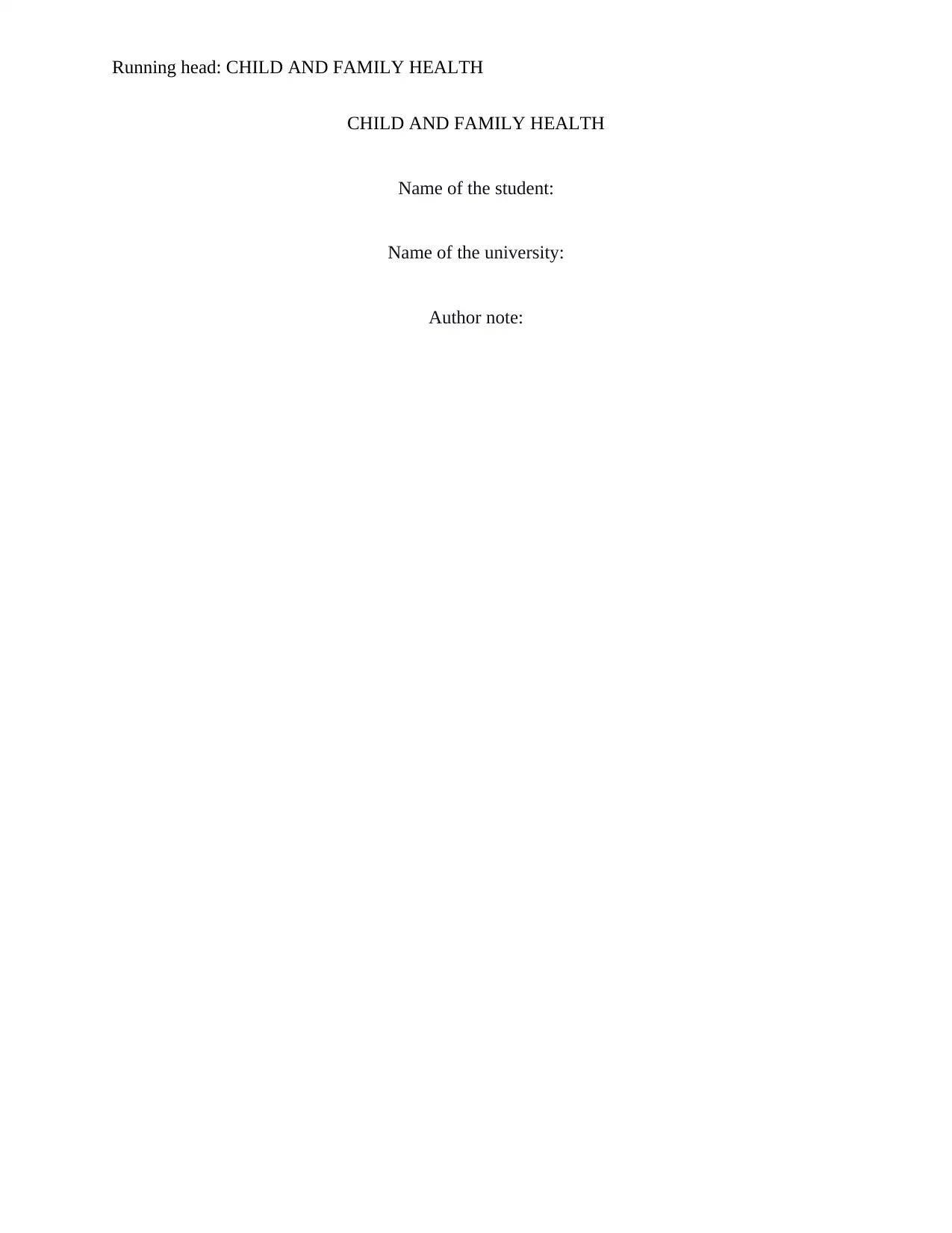
Running head: CHILD AND FAMILY HEALTH
CHILD AND FAMILY HEALTH
Name of the student:
Name of the university:
Author note:
CHILD AND FAMILY HEALTH
Name of the student:
Name of the university:
Author note:
Secure Best Marks with AI Grader
Need help grading? Try our AI Grader for instant feedback on your assignments.
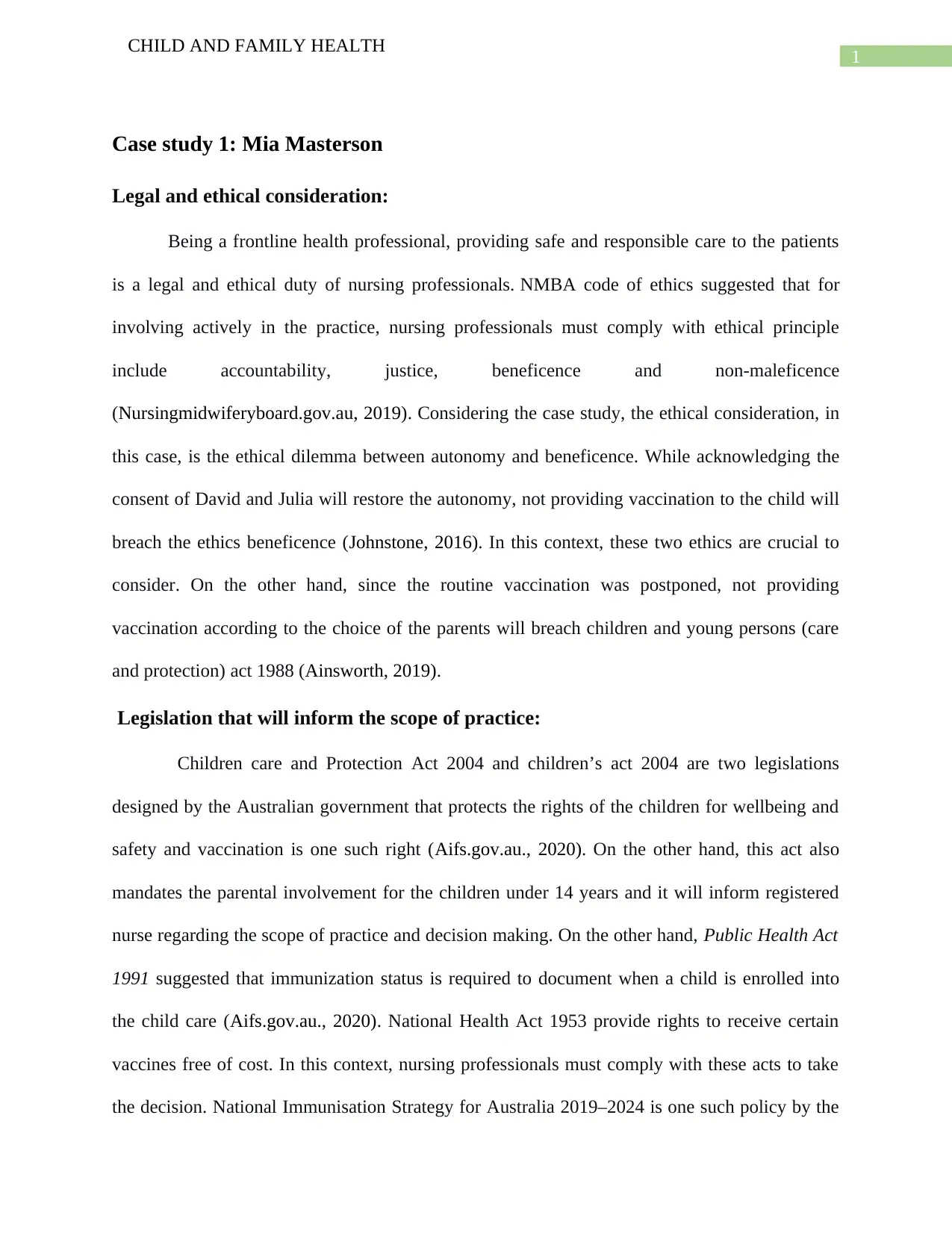
1
CHILD AND FAMILY HEALTH
Case study 1: Mia Masterson
Legal and ethical consideration:
Being a frontline health professional, providing safe and responsible care to the patients
is a legal and ethical duty of nursing professionals. NMBA code of ethics suggested that for
involving actively in the practice, nursing professionals must comply with ethical principle
include accountability, justice, beneficence and non-maleficence
(Nursingmidwiferyboard.gov.au, 2019). Considering the case study, the ethical consideration, in
this case, is the ethical dilemma between autonomy and beneficence. While acknowledging the
consent of David and Julia will restore the autonomy, not providing vaccination to the child will
breach the ethics beneficence (Johnstone, 2016). In this context, these two ethics are crucial to
consider. On the other hand, since the routine vaccination was postponed, not providing
vaccination according to the choice of the parents will breach children and young persons (care
and protection) act 1988 (Ainsworth, 2019).
Legislation that will inform the scope of practice:
Children care and Protection Act 2004 and children’s act 2004 are two legislations
designed by the Australian government that protects the rights of the children for wellbeing and
safety and vaccination is one such right (Aifs.gov.au., 2020). On the other hand, this act also
mandates the parental involvement for the children under 14 years and it will inform registered
nurse regarding the scope of practice and decision making. On the other hand, Public Health Act
1991 suggested that immunization status is required to document when a child is enrolled into
the child care (Aifs.gov.au., 2020). National Health Act 1953 provide rights to receive certain
vaccines free of cost. In this context, nursing professionals must comply with these acts to take
the decision. National Immunisation Strategy for Australia 2019–2024 is one such policy by the
CHILD AND FAMILY HEALTH
Case study 1: Mia Masterson
Legal and ethical consideration:
Being a frontline health professional, providing safe and responsible care to the patients
is a legal and ethical duty of nursing professionals. NMBA code of ethics suggested that for
involving actively in the practice, nursing professionals must comply with ethical principle
include accountability, justice, beneficence and non-maleficence
(Nursingmidwiferyboard.gov.au, 2019). Considering the case study, the ethical consideration, in
this case, is the ethical dilemma between autonomy and beneficence. While acknowledging the
consent of David and Julia will restore the autonomy, not providing vaccination to the child will
breach the ethics beneficence (Johnstone, 2016). In this context, these two ethics are crucial to
consider. On the other hand, since the routine vaccination was postponed, not providing
vaccination according to the choice of the parents will breach children and young persons (care
and protection) act 1988 (Ainsworth, 2019).
Legislation that will inform the scope of practice:
Children care and Protection Act 2004 and children’s act 2004 are two legislations
designed by the Australian government that protects the rights of the children for wellbeing and
safety and vaccination is one such right (Aifs.gov.au., 2020). On the other hand, this act also
mandates the parental involvement for the children under 14 years and it will inform registered
nurse regarding the scope of practice and decision making. On the other hand, Public Health Act
1991 suggested that immunization status is required to document when a child is enrolled into
the child care (Aifs.gov.au., 2020). National Health Act 1953 provide rights to receive certain
vaccines free of cost. In this context, nursing professionals must comply with these acts to take
the decision. National Immunisation Strategy for Australia 2019–2024 is one such policy by the
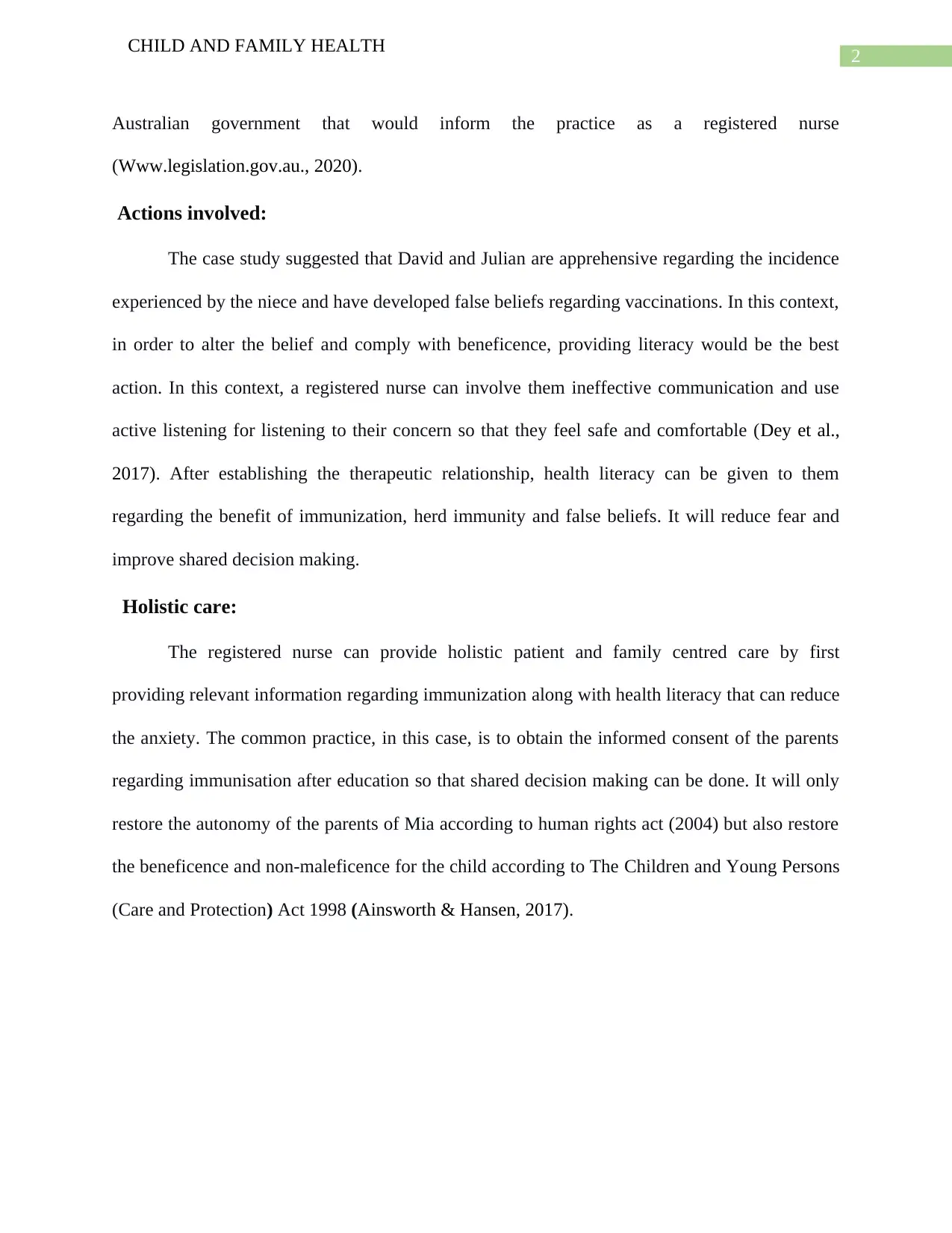
2
CHILD AND FAMILY HEALTH
Australian government that would inform the practice as a registered nurse
(Www.legislation.gov.au., 2020).
Actions involved:
The case study suggested that David and Julian are apprehensive regarding the incidence
experienced by the niece and have developed false beliefs regarding vaccinations. In this context,
in order to alter the belief and comply with beneficence, providing literacy would be the best
action. In this context, a registered nurse can involve them ineffective communication and use
active listening for listening to their concern so that they feel safe and comfortable (Dey et al.,
2017). After establishing the therapeutic relationship, health literacy can be given to them
regarding the benefit of immunization, herd immunity and false beliefs. It will reduce fear and
improve shared decision making.
Holistic care:
The registered nurse can provide holistic patient and family centred care by first
providing relevant information regarding immunization along with health literacy that can reduce
the anxiety. The common practice, in this case, is to obtain the informed consent of the parents
regarding immunisation after education so that shared decision making can be done. It will only
restore the autonomy of the parents of Mia according to human rights act (2004) but also restore
the beneficence and non-maleficence for the child according to The Children and Young Persons
(Care and Protection) Act 1998 (Ainsworth & Hansen, 2017).
CHILD AND FAMILY HEALTH
Australian government that would inform the practice as a registered nurse
(Www.legislation.gov.au., 2020).
Actions involved:
The case study suggested that David and Julian are apprehensive regarding the incidence
experienced by the niece and have developed false beliefs regarding vaccinations. In this context,
in order to alter the belief and comply with beneficence, providing literacy would be the best
action. In this context, a registered nurse can involve them ineffective communication and use
active listening for listening to their concern so that they feel safe and comfortable (Dey et al.,
2017). After establishing the therapeutic relationship, health literacy can be given to them
regarding the benefit of immunization, herd immunity and false beliefs. It will reduce fear and
improve shared decision making.
Holistic care:
The registered nurse can provide holistic patient and family centred care by first
providing relevant information regarding immunization along with health literacy that can reduce
the anxiety. The common practice, in this case, is to obtain the informed consent of the parents
regarding immunisation after education so that shared decision making can be done. It will only
restore the autonomy of the parents of Mia according to human rights act (2004) but also restore
the beneficence and non-maleficence for the child according to The Children and Young Persons
(Care and Protection) Act 1998 (Ainsworth & Hansen, 2017).
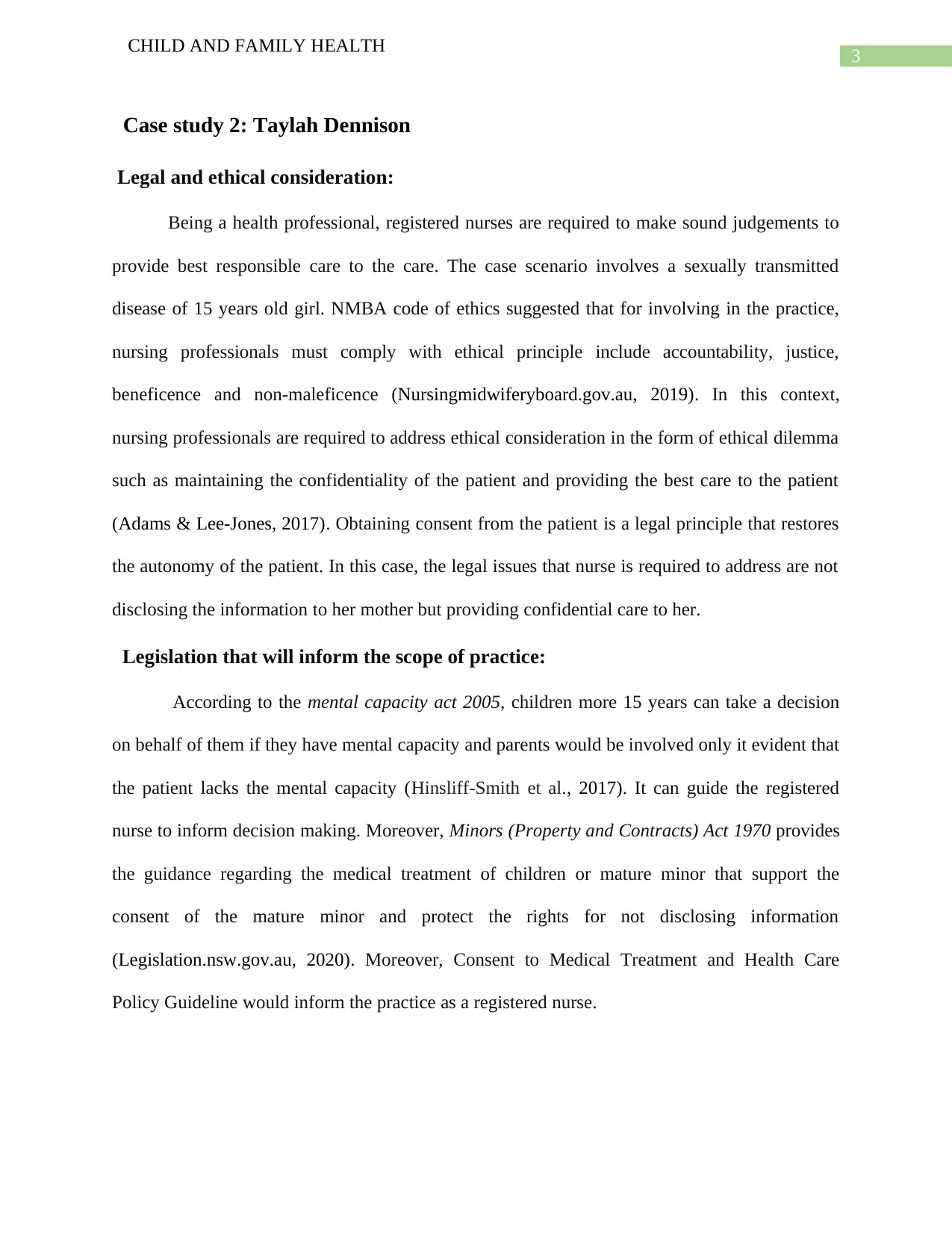
3
CHILD AND FAMILY HEALTH
Case study 2: Taylah Dennison
Legal and ethical consideration:
Being a health professional, registered nurses are required to make sound judgements to
provide best responsible care to the care. The case scenario involves a sexually transmitted
disease of 15 years old girl. NMBA code of ethics suggested that for involving in the practice,
nursing professionals must comply with ethical principle include accountability, justice,
beneficence and non-maleficence (Nursingmidwiferyboard.gov.au, 2019). In this context,
nursing professionals are required to address ethical consideration in the form of ethical dilemma
such as maintaining the confidentiality of the patient and providing the best care to the patient
(Adams & Lee‐Jones, 2017). Obtaining consent from the patient is a legal principle that restores
the autonomy of the patient. In this case, the legal issues that nurse is required to address are not
disclosing the information to her mother but providing confidential care to her.
Legislation that will inform the scope of practice:
According to the mental capacity act 2005, children more 15 years can take a decision
on behalf of them if they have mental capacity and parents would be involved only it evident that
the patient lacks the mental capacity (Hinsliff‐Smith et al., 2017). It can guide the registered
nurse to inform decision making. Moreover, Minors (Property and Contracts) Act 1970 provides
the guidance regarding the medical treatment of children or mature minor that support the
consent of the mature minor and protect the rights for not disclosing information
(Legislation.nsw.gov.au, 2020). Moreover, Consent to Medical Treatment and Health Care
Policy Guideline would inform the practice as a registered nurse.
CHILD AND FAMILY HEALTH
Case study 2: Taylah Dennison
Legal and ethical consideration:
Being a health professional, registered nurses are required to make sound judgements to
provide best responsible care to the care. The case scenario involves a sexually transmitted
disease of 15 years old girl. NMBA code of ethics suggested that for involving in the practice,
nursing professionals must comply with ethical principle include accountability, justice,
beneficence and non-maleficence (Nursingmidwiferyboard.gov.au, 2019). In this context,
nursing professionals are required to address ethical consideration in the form of ethical dilemma
such as maintaining the confidentiality of the patient and providing the best care to the patient
(Adams & Lee‐Jones, 2017). Obtaining consent from the patient is a legal principle that restores
the autonomy of the patient. In this case, the legal issues that nurse is required to address are not
disclosing the information to her mother but providing confidential care to her.
Legislation that will inform the scope of practice:
According to the mental capacity act 2005, children more 15 years can take a decision
on behalf of them if they have mental capacity and parents would be involved only it evident that
the patient lacks the mental capacity (Hinsliff‐Smith et al., 2017). It can guide the registered
nurse to inform decision making. Moreover, Minors (Property and Contracts) Act 1970 provides
the guidance regarding the medical treatment of children or mature minor that support the
consent of the mature minor and protect the rights for not disclosing information
(Legislation.nsw.gov.au, 2020). Moreover, Consent to Medical Treatment and Health Care
Policy Guideline would inform the practice as a registered nurse.
Secure Best Marks with AI Grader
Need help grading? Try our AI Grader for instant feedback on your assignments.
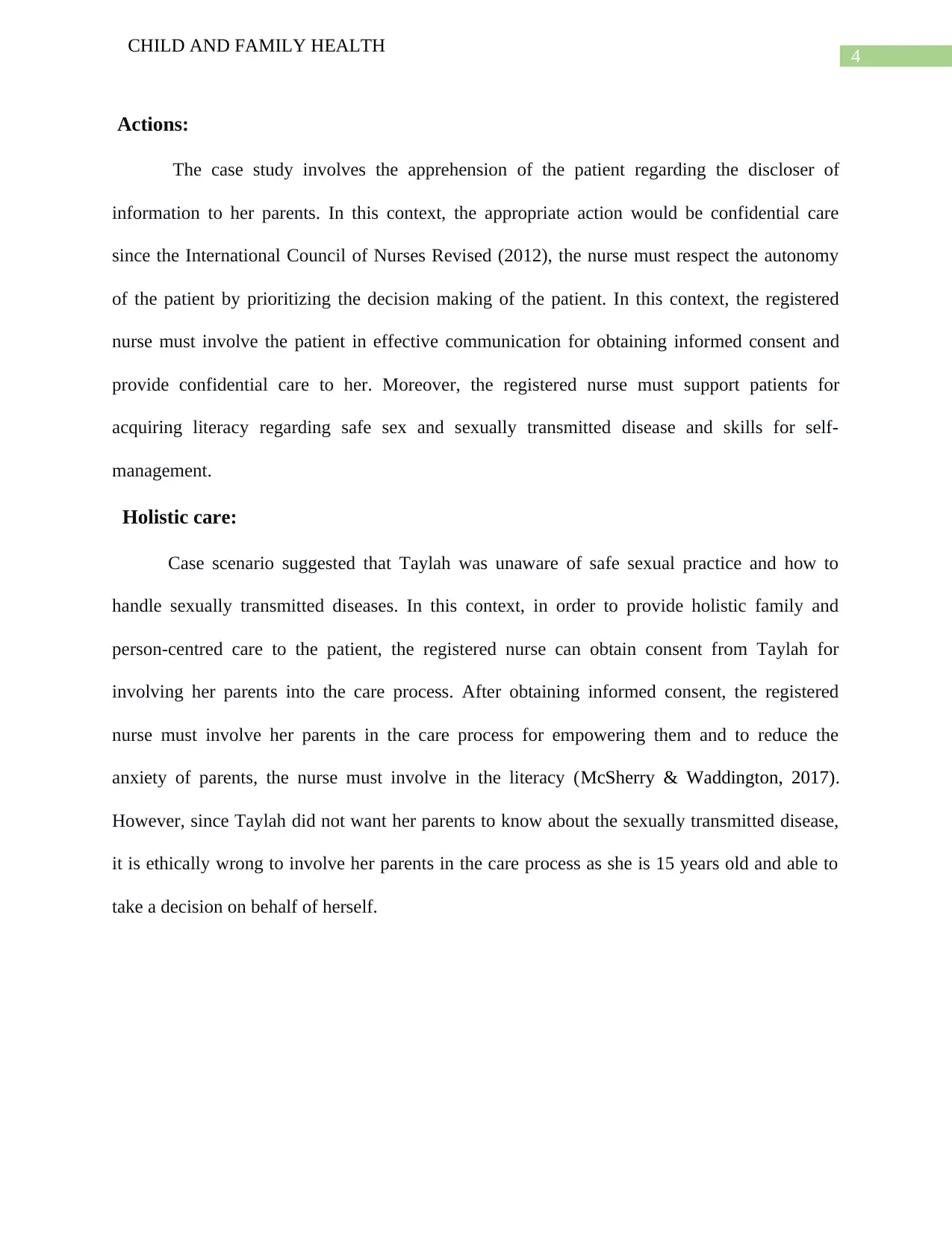
4
CHILD AND FAMILY HEALTH
Actions:
The case study involves the apprehension of the patient regarding the discloser of
information to her parents. In this context, the appropriate action would be confidential care
since the International Council of Nurses Revised (2012), the nurse must respect the autonomy
of the patient by prioritizing the decision making of the patient. In this context, the registered
nurse must involve the patient in effective communication for obtaining informed consent and
provide confidential care to her. Moreover, the registered nurse must support patients for
acquiring literacy regarding safe sex and sexually transmitted disease and skills for self-
management.
Holistic care:
Case scenario suggested that Taylah was unaware of safe sexual practice and how to
handle sexually transmitted diseases. In this context, in order to provide holistic family and
person-centred care to the patient, the registered nurse can obtain consent from Taylah for
involving her parents into the care process. After obtaining informed consent, the registered
nurse must involve her parents in the care process for empowering them and to reduce the
anxiety of parents, the nurse must involve in the literacy (McSherry & Waddington, 2017).
However, since Taylah did not want her parents to know about the sexually transmitted disease,
it is ethically wrong to involve her parents in the care process as she is 15 years old and able to
take a decision on behalf of herself.
CHILD AND FAMILY HEALTH
Actions:
The case study involves the apprehension of the patient regarding the discloser of
information to her parents. In this context, the appropriate action would be confidential care
since the International Council of Nurses Revised (2012), the nurse must respect the autonomy
of the patient by prioritizing the decision making of the patient. In this context, the registered
nurse must involve the patient in effective communication for obtaining informed consent and
provide confidential care to her. Moreover, the registered nurse must support patients for
acquiring literacy regarding safe sex and sexually transmitted disease and skills for self-
management.
Holistic care:
Case scenario suggested that Taylah was unaware of safe sexual practice and how to
handle sexually transmitted diseases. In this context, in order to provide holistic family and
person-centred care to the patient, the registered nurse can obtain consent from Taylah for
involving her parents into the care process. After obtaining informed consent, the registered
nurse must involve her parents in the care process for empowering them and to reduce the
anxiety of parents, the nurse must involve in the literacy (McSherry & Waddington, 2017).
However, since Taylah did not want her parents to know about the sexually transmitted disease,
it is ethically wrong to involve her parents in the care process as she is 15 years old and able to
take a decision on behalf of herself.
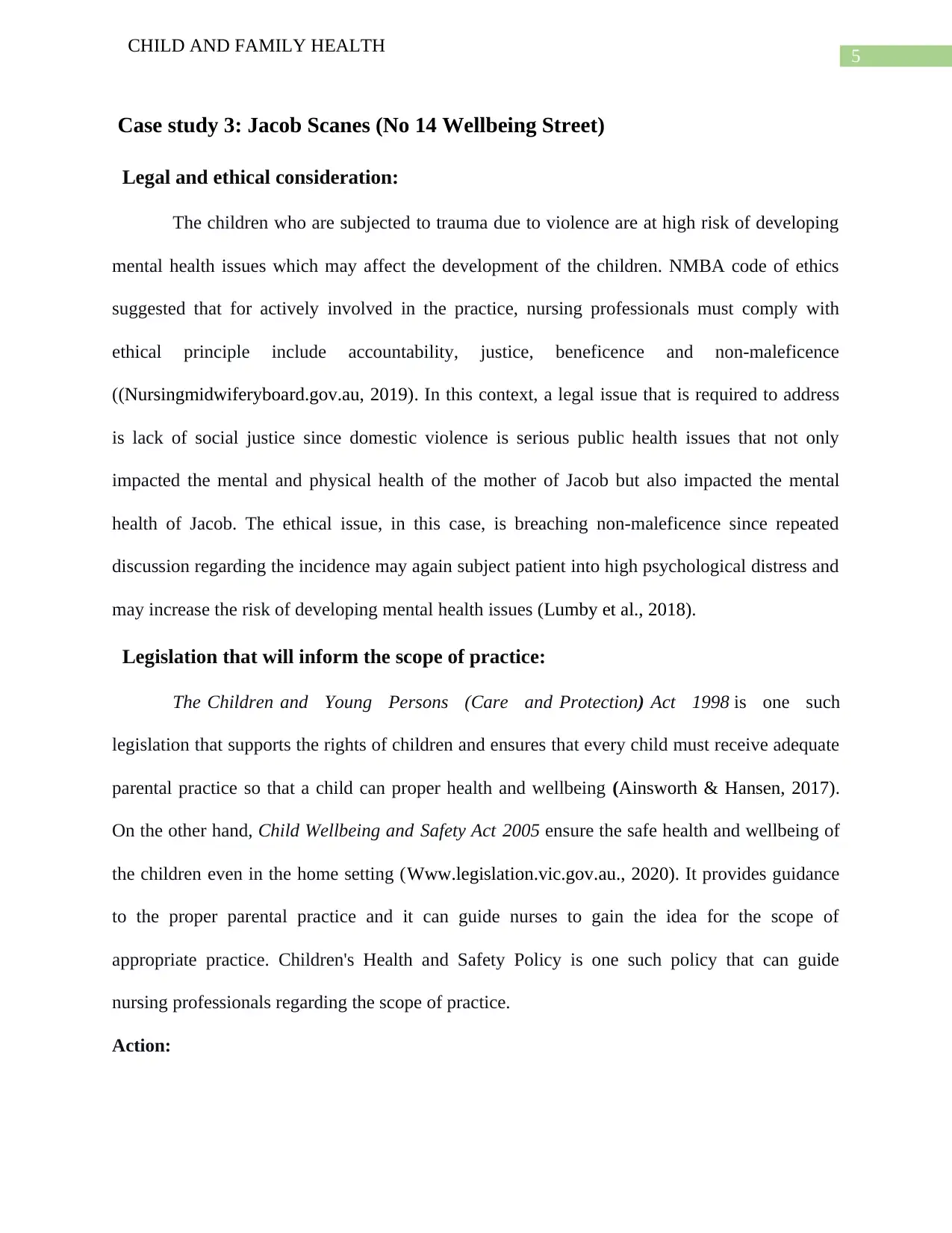
5
CHILD AND FAMILY HEALTH
Case study 3: Jacob Scanes (No 14 Wellbeing Street)
Legal and ethical consideration:
The children who are subjected to trauma due to violence are at high risk of developing
mental health issues which may affect the development of the children. NMBA code of ethics
suggested that for actively involved in the practice, nursing professionals must comply with
ethical principle include accountability, justice, beneficence and non-maleficence
((Nursingmidwiferyboard.gov.au, 2019). In this context, a legal issue that is required to address
is lack of social justice since domestic violence is serious public health issues that not only
impacted the mental and physical health of the mother of Jacob but also impacted the mental
health of Jacob. The ethical issue, in this case, is breaching non-maleficence since repeated
discussion regarding the incidence may again subject patient into high psychological distress and
may increase the risk of developing mental health issues (Lumby et al., 2018).
Legislation that will inform the scope of practice:
The Children and Young Persons (Care and Protection) Act 1998 is one such
legislation that supports the rights of children and ensures that every child must receive adequate
parental practice so that a child can proper health and wellbeing (Ainsworth & Hansen, 2017).
On the other hand, Child Wellbeing and Safety Act 2005 ensure the safe health and wellbeing of
the children even in the home setting (Www.legislation.vic.gov.au., 2020). It provides guidance
to the proper parental practice and it can guide nurses to gain the idea for the scope of
appropriate practice. Children's Health and Safety Policy is one such policy that can guide
nursing professionals regarding the scope of practice.
Action:
CHILD AND FAMILY HEALTH
Case study 3: Jacob Scanes (No 14 Wellbeing Street)
Legal and ethical consideration:
The children who are subjected to trauma due to violence are at high risk of developing
mental health issues which may affect the development of the children. NMBA code of ethics
suggested that for actively involved in the practice, nursing professionals must comply with
ethical principle include accountability, justice, beneficence and non-maleficence
((Nursingmidwiferyboard.gov.au, 2019). In this context, a legal issue that is required to address
is lack of social justice since domestic violence is serious public health issues that not only
impacted the mental and physical health of the mother of Jacob but also impacted the mental
health of Jacob. The ethical issue, in this case, is breaching non-maleficence since repeated
discussion regarding the incidence may again subject patient into high psychological distress and
may increase the risk of developing mental health issues (Lumby et al., 2018).
Legislation that will inform the scope of practice:
The Children and Young Persons (Care and Protection) Act 1998 is one such
legislation that supports the rights of children and ensures that every child must receive adequate
parental practice so that a child can proper health and wellbeing (Ainsworth & Hansen, 2017).
On the other hand, Child Wellbeing and Safety Act 2005 ensure the safe health and wellbeing of
the children even in the home setting (Www.legislation.vic.gov.au., 2020). It provides guidance
to the proper parental practice and it can guide nurses to gain the idea for the scope of
appropriate practice. Children's Health and Safety Policy is one such policy that can guide
nursing professionals regarding the scope of practice.
Action:
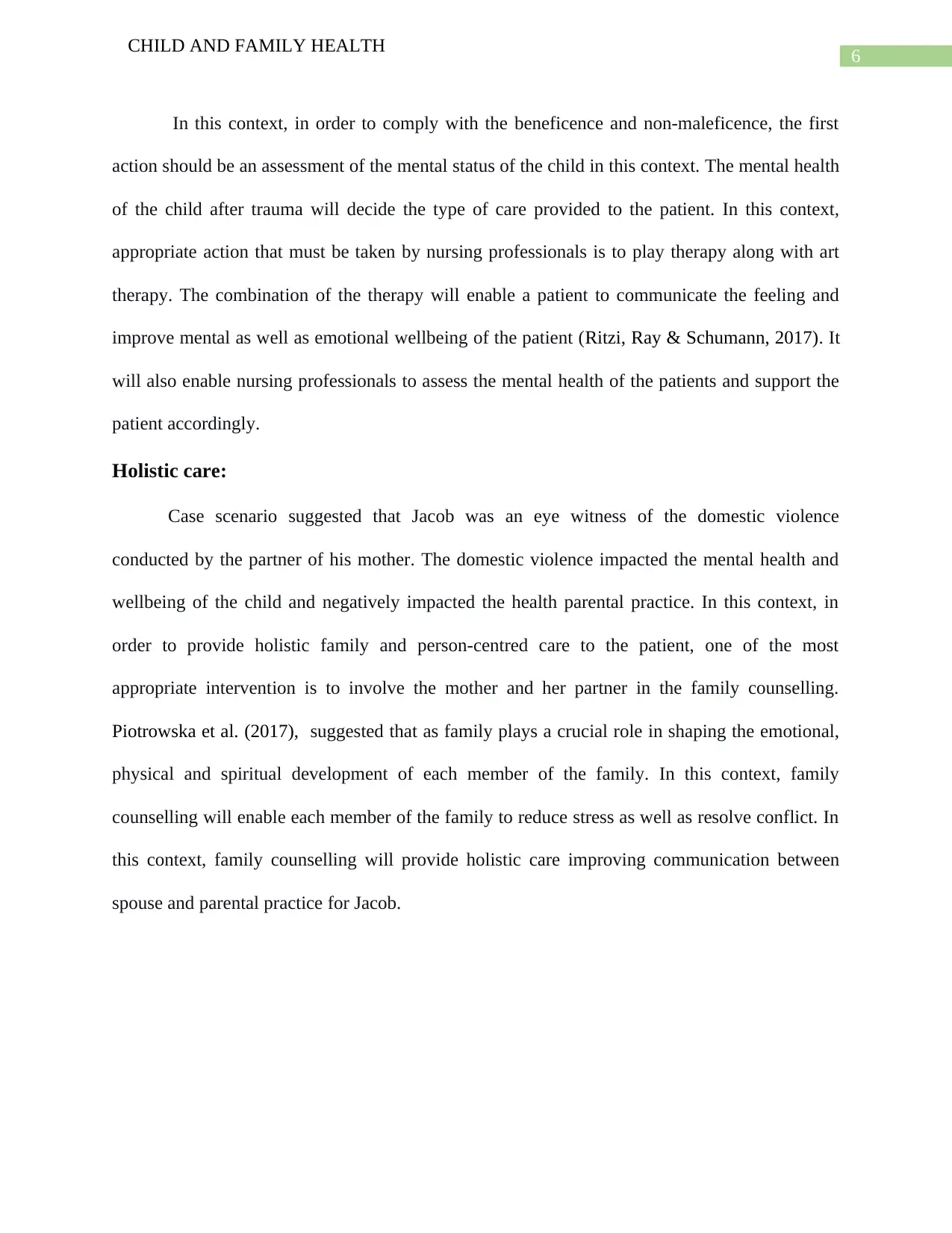
6
CHILD AND FAMILY HEALTH
In this context, in order to comply with the beneficence and non-maleficence, the first
action should be an assessment of the mental status of the child in this context. The mental health
of the child after trauma will decide the type of care provided to the patient. In this context,
appropriate action that must be taken by nursing professionals is to play therapy along with art
therapy. The combination of the therapy will enable a patient to communicate the feeling and
improve mental as well as emotional wellbeing of the patient (Ritzi, Ray & Schumann, 2017). It
will also enable nursing professionals to assess the mental health of the patients and support the
patient accordingly.
Holistic care:
Case scenario suggested that Jacob was an eye witness of the domestic violence
conducted by the partner of his mother. The domestic violence impacted the mental health and
wellbeing of the child and negatively impacted the health parental practice. In this context, in
order to provide holistic family and person-centred care to the patient, one of the most
appropriate intervention is to involve the mother and her partner in the family counselling.
Piotrowska et al. (2017), suggested that as family plays a crucial role in shaping the emotional,
physical and spiritual development of each member of the family. In this context, family
counselling will enable each member of the family to reduce stress as well as resolve conflict. In
this context, family counselling will provide holistic care improving communication between
spouse and parental practice for Jacob.
CHILD AND FAMILY HEALTH
In this context, in order to comply with the beneficence and non-maleficence, the first
action should be an assessment of the mental status of the child in this context. The mental health
of the child after trauma will decide the type of care provided to the patient. In this context,
appropriate action that must be taken by nursing professionals is to play therapy along with art
therapy. The combination of the therapy will enable a patient to communicate the feeling and
improve mental as well as emotional wellbeing of the patient (Ritzi, Ray & Schumann, 2017). It
will also enable nursing professionals to assess the mental health of the patients and support the
patient accordingly.
Holistic care:
Case scenario suggested that Jacob was an eye witness of the domestic violence
conducted by the partner of his mother. The domestic violence impacted the mental health and
wellbeing of the child and negatively impacted the health parental practice. In this context, in
order to provide holistic family and person-centred care to the patient, one of the most
appropriate intervention is to involve the mother and her partner in the family counselling.
Piotrowska et al. (2017), suggested that as family plays a crucial role in shaping the emotional,
physical and spiritual development of each member of the family. In this context, family
counselling will enable each member of the family to reduce stress as well as resolve conflict. In
this context, family counselling will provide holistic care improving communication between
spouse and parental practice for Jacob.
Paraphrase This Document
Need a fresh take? Get an instant paraphrase of this document with our AI Paraphraser
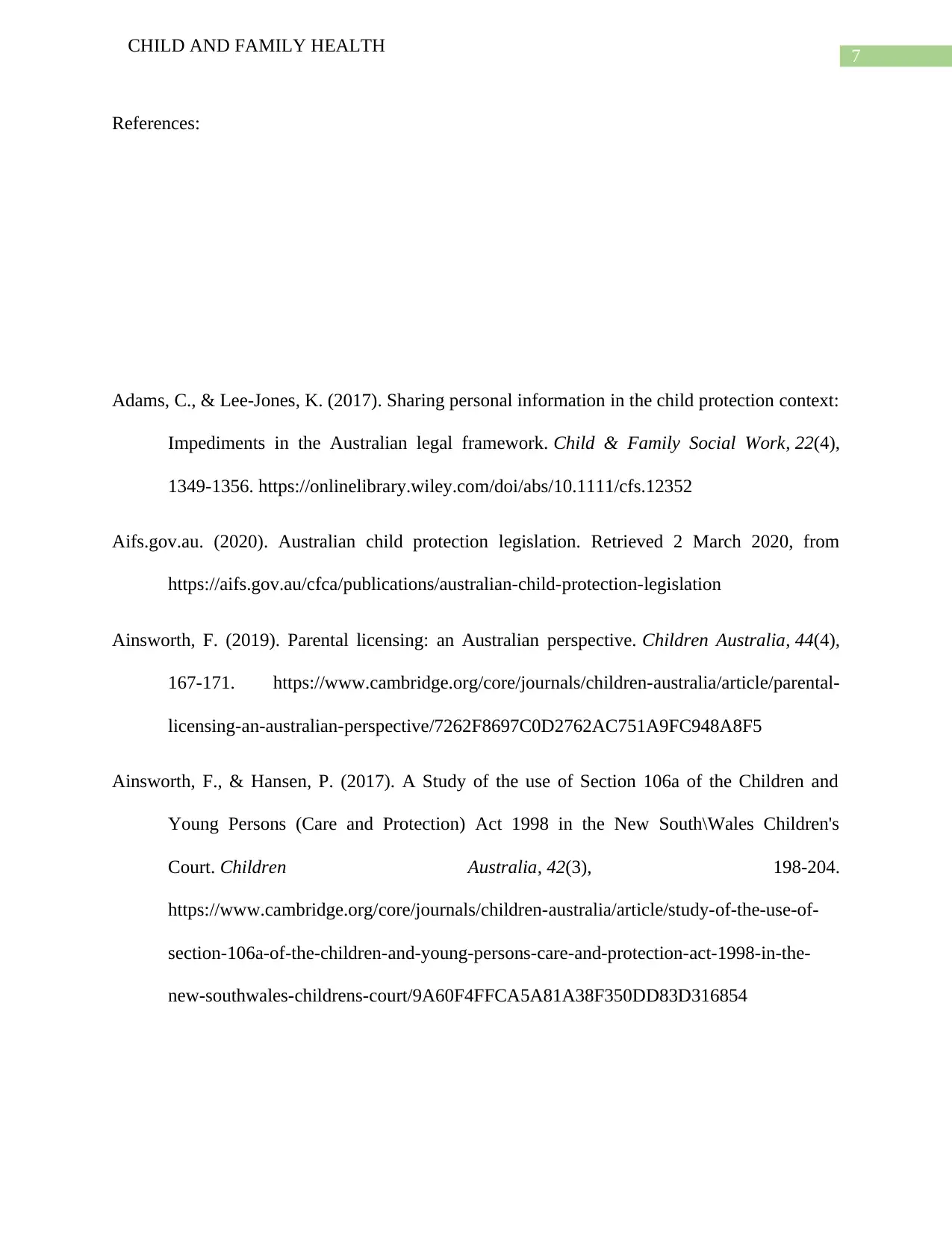
7
CHILD AND FAMILY HEALTH
References:
Adams, C., & Lee‐Jones, K. (2017). Sharing personal information in the child protection context:
Impediments in the Australian legal framework. Child & Family Social Work, 22(4),
1349-1356. https://onlinelibrary.wiley.com/doi/abs/10.1111/cfs.12352
Aifs.gov.au. (2020). Australian child protection legislation. Retrieved 2 March 2020, from
https://aifs.gov.au/cfca/publications/australian-child-protection-legislation
Ainsworth, F. (2019). Parental licensing: an Australian perspective. Children Australia, 44(4),
167-171. https://www.cambridge.org/core/journals/children-australia/article/parental-
licensing-an-australian-perspective/7262F8697C0D2762AC751A9FC948A8F5
Ainsworth, F., & Hansen, P. (2017). A Study of the use of Section 106a of the Children and
Young Persons (Care and Protection) Act 1998 in the New South\Wales Children's
Court. Children Australia, 42(3), 198-204.
https://www.cambridge.org/core/journals/children-australia/article/study-of-the-use-of-
section-106a-of-the-children-and-young-persons-care-and-protection-act-1998-in-the-
new-southwales-childrens-court/9A60F4FFCA5A81A38F350DD83D316854
CHILD AND FAMILY HEALTH
References:
Adams, C., & Lee‐Jones, K. (2017). Sharing personal information in the child protection context:
Impediments in the Australian legal framework. Child & Family Social Work, 22(4),
1349-1356. https://onlinelibrary.wiley.com/doi/abs/10.1111/cfs.12352
Aifs.gov.au. (2020). Australian child protection legislation. Retrieved 2 March 2020, from
https://aifs.gov.au/cfca/publications/australian-child-protection-legislation
Ainsworth, F. (2019). Parental licensing: an Australian perspective. Children Australia, 44(4),
167-171. https://www.cambridge.org/core/journals/children-australia/article/parental-
licensing-an-australian-perspective/7262F8697C0D2762AC751A9FC948A8F5
Ainsworth, F., & Hansen, P. (2017). A Study of the use of Section 106a of the Children and
Young Persons (Care and Protection) Act 1998 in the New South\Wales Children's
Court. Children Australia, 42(3), 198-204.
https://www.cambridge.org/core/journals/children-australia/article/study-of-the-use-of-
section-106a-of-the-children-and-young-persons-care-and-protection-act-1998-in-the-
new-southwales-childrens-court/9A60F4FFCA5A81A38F350DD83D316854
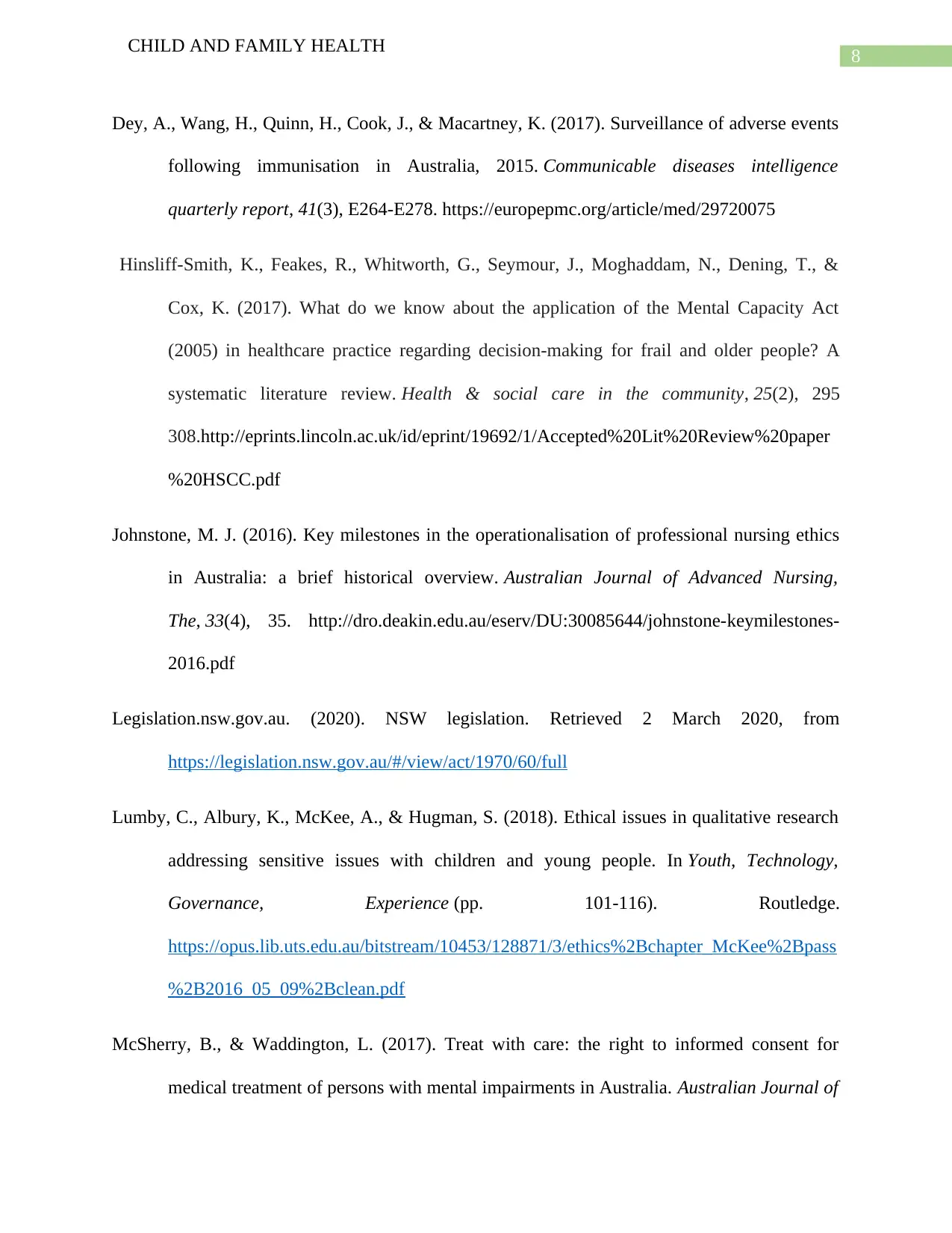
8
CHILD AND FAMILY HEALTH
Dey, A., Wang, H., Quinn, H., Cook, J., & Macartney, K. (2017). Surveillance of adverse events
following immunisation in Australia, 2015. Communicable diseases intelligence
quarterly report, 41(3), E264-E278. https://europepmc.org/article/med/29720075
Hinsliff‐Smith, K., Feakes, R., Whitworth, G., Seymour, J., Moghaddam, N., Dening, T., &
Cox, K. (2017). What do we know about the application of the Mental Capacity Act
(2005) in healthcare practice regarding decision‐making for frail and older people? A
systematic literature review. Health & social care in the community, 25(2), 295
308.http://eprints.lincoln.ac.uk/id/eprint/19692/1/Accepted%20Lit%20Review%20paper
%20HSCC.pdf
Johnstone, M. J. (2016). Key milestones in the operationalisation of professional nursing ethics
in Australia: a brief historical overview. Australian Journal of Advanced Nursing,
The, 33(4), 35. http://dro.deakin.edu.au/eserv/DU:30085644/johnstone-keymilestones-
2016.pdf
Legislation.nsw.gov.au. (2020). NSW legislation. Retrieved 2 March 2020, from
https://legislation.nsw.gov.au/#/view/act/1970/60/full
Lumby, C., Albury, K., McKee, A., & Hugman, S. (2018). Ethical issues in qualitative research
addressing sensitive issues with children and young people. In Youth, Technology,
Governance, Experience (pp. 101-116). Routledge.
https://opus.lib.uts.edu.au/bitstream/10453/128871/3/ethics%2Bchapter_McKee%2Bpass
%2B2016_05_09%2Bclean.pdf
McSherry, B., & Waddington, L. (2017). Treat with care: the right to informed consent for
medical treatment of persons with mental impairments in Australia. Australian Journal of
CHILD AND FAMILY HEALTH
Dey, A., Wang, H., Quinn, H., Cook, J., & Macartney, K. (2017). Surveillance of adverse events
following immunisation in Australia, 2015. Communicable diseases intelligence
quarterly report, 41(3), E264-E278. https://europepmc.org/article/med/29720075
Hinsliff‐Smith, K., Feakes, R., Whitworth, G., Seymour, J., Moghaddam, N., Dening, T., &
Cox, K. (2017). What do we know about the application of the Mental Capacity Act
(2005) in healthcare practice regarding decision‐making for frail and older people? A
systematic literature review. Health & social care in the community, 25(2), 295
308.http://eprints.lincoln.ac.uk/id/eprint/19692/1/Accepted%20Lit%20Review%20paper
%20HSCC.pdf
Johnstone, M. J. (2016). Key milestones in the operationalisation of professional nursing ethics
in Australia: a brief historical overview. Australian Journal of Advanced Nursing,
The, 33(4), 35. http://dro.deakin.edu.au/eserv/DU:30085644/johnstone-keymilestones-
2016.pdf
Legislation.nsw.gov.au. (2020). NSW legislation. Retrieved 2 March 2020, from
https://legislation.nsw.gov.au/#/view/act/1970/60/full
Lumby, C., Albury, K., McKee, A., & Hugman, S. (2018). Ethical issues in qualitative research
addressing sensitive issues with children and young people. In Youth, Technology,
Governance, Experience (pp. 101-116). Routledge.
https://opus.lib.uts.edu.au/bitstream/10453/128871/3/ethics%2Bchapter_McKee%2Bpass
%2B2016_05_09%2Bclean.pdf
McSherry, B., & Waddington, L. (2017). Treat with care: the right to informed consent for
medical treatment of persons with mental impairments in Australia. Australian Journal of
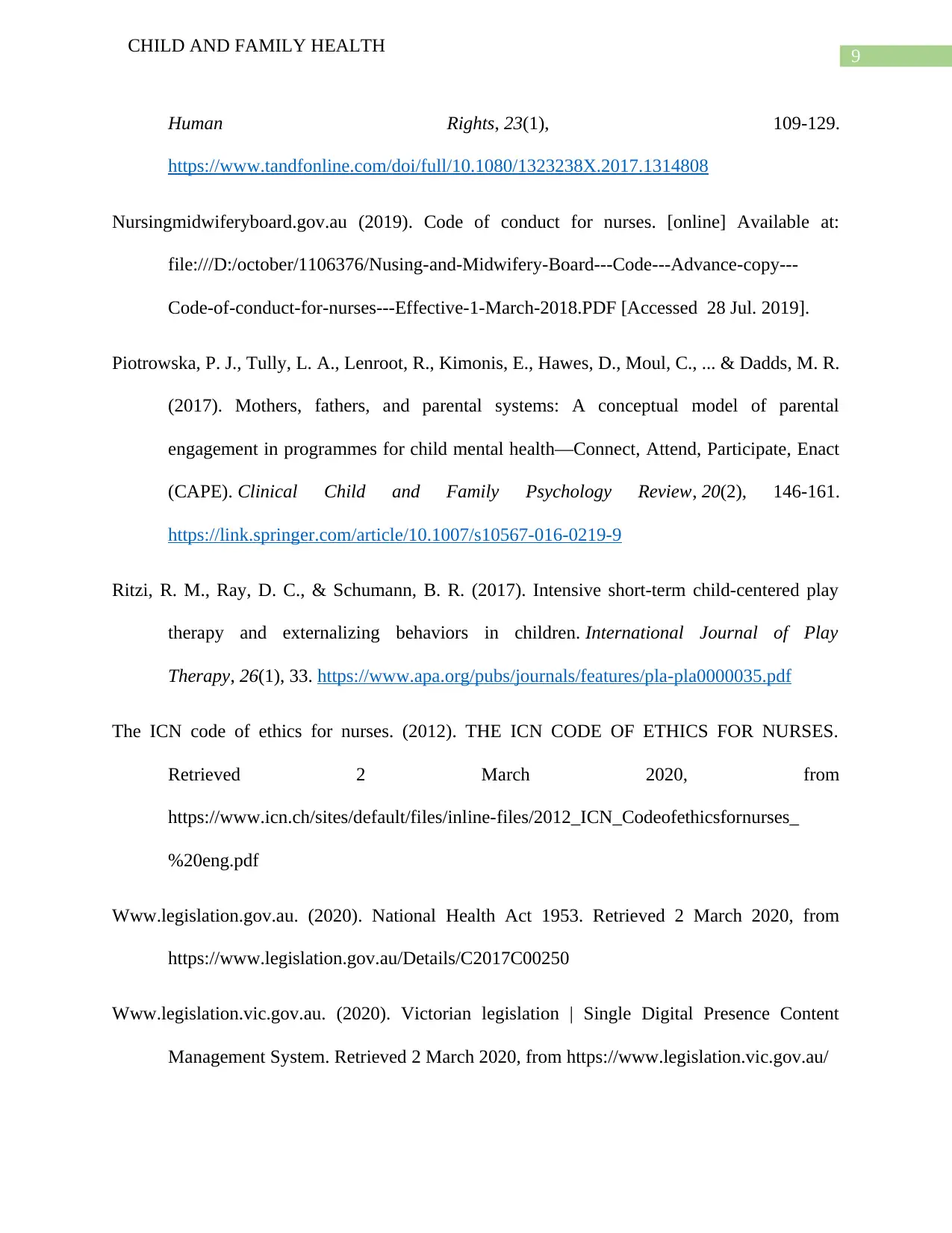
9
CHILD AND FAMILY HEALTH
Human Rights, 23(1), 109-129.
https://www.tandfonline.com/doi/full/10.1080/1323238X.2017.1314808
Nursingmidwiferyboard.gov.au (2019). Code of conduct for nurses. [online] Available at:
file:///D:/october/1106376/Nusing-and-Midwifery-Board---Code---Advance-copy---
Code-of-conduct-for-nurses---Effective-1-March-2018.PDF [Accessed 28 Jul. 2019].
Piotrowska, P. J., Tully, L. A., Lenroot, R., Kimonis, E., Hawes, D., Moul, C., ... & Dadds, M. R.
(2017). Mothers, fathers, and parental systems: A conceptual model of parental
engagement in programmes for child mental health—Connect, Attend, Participate, Enact
(CAPE). Clinical Child and Family Psychology Review, 20(2), 146-161.
https://link.springer.com/article/10.1007/s10567-016-0219-9
Ritzi, R. M., Ray, D. C., & Schumann, B. R. (2017). Intensive short-term child-centered play
therapy and externalizing behaviors in children. International Journal of Play
Therapy, 26(1), 33. https://www.apa.org/pubs/journals/features/pla-pla0000035.pdf
The ICN code of ethics for nurses. (2012). THE ICN CODE OF ETHICS FOR NURSES.
Retrieved 2 March 2020, from
https://www.icn.ch/sites/default/files/inline-files/2012_ICN_Codeofethicsfornurses_
%20eng.pdf
Www.legislation.gov.au. (2020). National Health Act 1953. Retrieved 2 March 2020, from
https://www.legislation.gov.au/Details/C2017C00250
Www.legislation.vic.gov.au. (2020). Victorian legislation | Single Digital Presence Content
Management System. Retrieved 2 March 2020, from https://www.legislation.vic.gov.au/
CHILD AND FAMILY HEALTH
Human Rights, 23(1), 109-129.
https://www.tandfonline.com/doi/full/10.1080/1323238X.2017.1314808
Nursingmidwiferyboard.gov.au (2019). Code of conduct for nurses. [online] Available at:
file:///D:/october/1106376/Nusing-and-Midwifery-Board---Code---Advance-copy---
Code-of-conduct-for-nurses---Effective-1-March-2018.PDF [Accessed 28 Jul. 2019].
Piotrowska, P. J., Tully, L. A., Lenroot, R., Kimonis, E., Hawes, D., Moul, C., ... & Dadds, M. R.
(2017). Mothers, fathers, and parental systems: A conceptual model of parental
engagement in programmes for child mental health—Connect, Attend, Participate, Enact
(CAPE). Clinical Child and Family Psychology Review, 20(2), 146-161.
https://link.springer.com/article/10.1007/s10567-016-0219-9
Ritzi, R. M., Ray, D. C., & Schumann, B. R. (2017). Intensive short-term child-centered play
therapy and externalizing behaviors in children. International Journal of Play
Therapy, 26(1), 33. https://www.apa.org/pubs/journals/features/pla-pla0000035.pdf
The ICN code of ethics for nurses. (2012). THE ICN CODE OF ETHICS FOR NURSES.
Retrieved 2 March 2020, from
https://www.icn.ch/sites/default/files/inline-files/2012_ICN_Codeofethicsfornurses_
%20eng.pdf
Www.legislation.gov.au. (2020). National Health Act 1953. Retrieved 2 March 2020, from
https://www.legislation.gov.au/Details/C2017C00250
Www.legislation.vic.gov.au. (2020). Victorian legislation | Single Digital Presence Content
Management System. Retrieved 2 March 2020, from https://www.legislation.vic.gov.au/
Secure Best Marks with AI Grader
Need help grading? Try our AI Grader for instant feedback on your assignments.
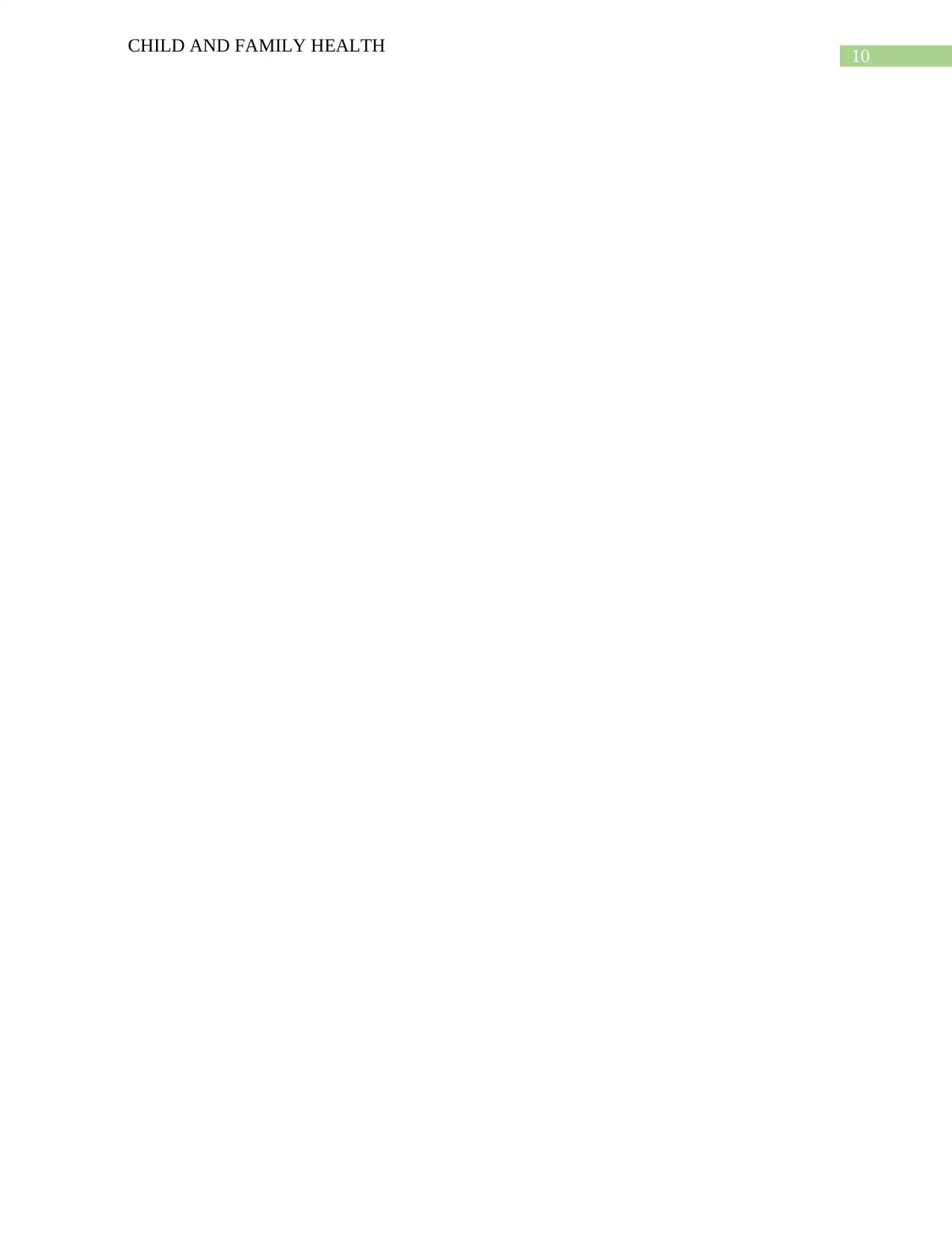
10
CHILD AND FAMILY HEALTH
CHILD AND FAMILY HEALTH
1 out of 11
Related Documents
Your All-in-One AI-Powered Toolkit for Academic Success.
+13062052269
info@desklib.com
Available 24*7 on WhatsApp / Email
![[object Object]](/_next/static/media/star-bottom.7253800d.svg)
Unlock your academic potential
© 2024 | Zucol Services PVT LTD | All rights reserved.





